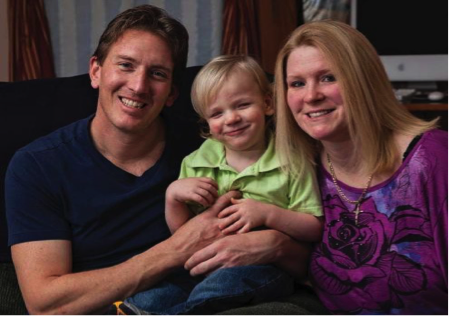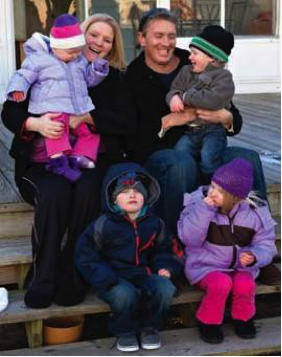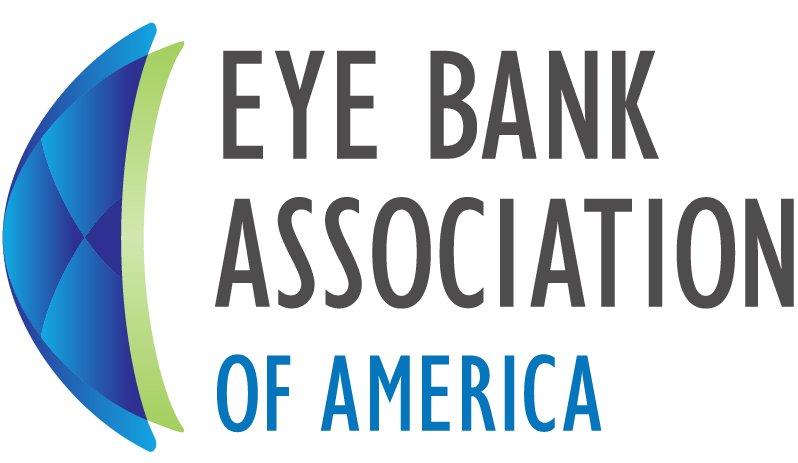
Tracey and Jimmy are a team.
Both animatedly share how everything they do is to ensure their family unit is growing and thriving. Their daily lives were pretty much like any other family with toddlers. Then, in 2011, they were blessed with another child, Peyton. Life suddenly became exceptional.
Tracey recalls the day they learned of her newborn’s eye condition.
“Peyton was one day old when he was diagnosed,” she remembers. “We immediately received condolences, lots of pamphlets, information on how to obtain money for transportation and eyeglasses—but that’s not what we needed. No one could tell us how to make our son’s vision as normal as possible.”
Jimmy, her husband, added, “We simply wanted to know how to help Peyton enjoy being a kid and how to succeed in life. We had many unanswered questions about how to help him rebuild his sight.”
Peyton was born with a congenital eye condition called Peter’s Anomaly. Babies with this rare condition have central cornea cloudiness for which surgical intervention is usually needed as soon as medically possible followed by visual rehabilitation. Peyton’s condition affected both eyes. At age 6 months, he had his first cornea transplant; his third transplant was in January 2013.
Answers came when they met Dr. Alex V. Levin, director of Pediatric Ophthalmology and Strabismus Service at Wills Eye Institute, and Dr. Brandon Ayres, corneal ophthalmology surgeon at Wills Eye Institute.
“Drs. Levin and Ayers have been phenomenal,” says Tracey. “You can tell they love the work they do with children. They treat Peyton, and they also interact with all our children. We are happy we were put in touch with them.”
Dr. Ayres, a member of the Eye Bank’s Medical Advisory Board, explained to Tracey and Jimmy that Lions Eye Bank of Delaware Valley supports families making end-of-life decisions. Those families donated their loved one’s cornea, making it possible for Peyton to have better vision.
“We just want to say thank you to Lions Eye Bank for helping us help our baby and to the families who donated corneas,” said Jimmy. “Because of their generosity, our family and Peyton are very fortunate. Thank you.”
More answers were obtained from an instructor assigned by the New Jersey Commission for the Blind and Visually Impaired, as well as from occupational and early intervention therapists, who are all pleased with Peyton’s progress.
“The Commission for the Blind gave us so many tips on how to work with Peyton, and he aced them all; he did great,” beamed Tracey. “Peyton always participates in the same activities as our other children which help him. Now he is doing all the things a 2 year old does.”

Though they’re very young, Jimmy and Tracey have begun to instill in their youngsters the importance of family.
“When Peyton has medical appointments, Tracey insists that all the kids go to Wills Eye Institute and be there for him to show their support,” says Jimmy. “When Peyton has inpatient surgery, I spend the night with him. Tracey and the kids return the next day, and we are all there when he comes out of surgery.”
Their hope is Peyton will eventually transition from eye glasses to contacts. In the meantime, Peyton continues to play with his siblings, happily singing nursery rhymes and dancing, filling their home with love and laughter. Just as with his brother and sisters, Peyton’s parents have high expectations for him.
As for any future challenges, Jimmy says, “It is just another hurdle we have to jump over and get through as a family, as a team.”


